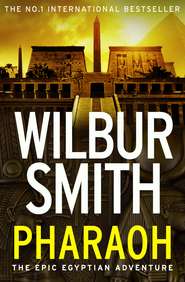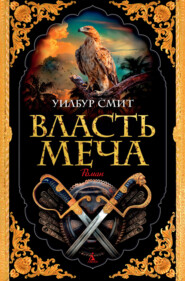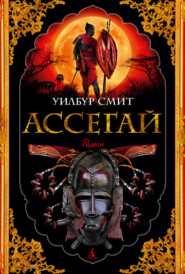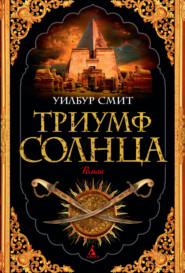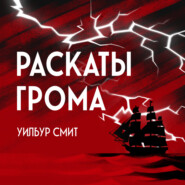По всем вопросам обращайтесь на: info@litportal.ru
(©) 2003-2024.
✖
Golden Lion
Автор
Год написания книги
2019
Настройки чтения
Размер шрифта
Высота строк
Поля
‘Aye, we’ll feed their craven livers to the sharks!’ boatswain John Lovell yelled, pointing his sword at Captain Tromp.
Hal wracked his brain, trying to find a way out of the choice that confronted him between his boat and crew on one side and his woman and child on the other.
‘How can I let them hurt her, Aboli?’ Hal hissed and was on the point of lowering his sword when Judith threw back her head, smashing her skull against her captor’s nose like a hammer against an eggshell. He howled in pain and let her go, dropping his knife as he instinctively raised his hands to his broken nose and bloody face. In a single, flowing sequence of movements Judith broke free, picked up her sword, slashed the razor edge across the belly of the man who had grabbed her and leapt at Tromp. His attention had all been on Hal. He was slow to react to what was happening behind him. By the time he had turned round Judith had covered the ground between them, and had put the pin-sharp tip of her blade to his throat before he could raise his own sword.
Seeing this, some of the Dutchmen threw themselves at Hal’s men, believing they had no choice but to fight or die, but they were cut down where they stood and the rest of Tromp’s boarding party dropped to their knees and hoisted their swords and boarding axes above their heads.
‘It is over, Captain,’ Aboli said, stooping to saw his blade across the throat of Judith’s would-be captor who now sat slumped against the Bough’s side, his gut ropes lying in a glistening, bloody mess between his legs.
The knowledge that Judith had been in danger, and the guilty awareness of how close he had come to surrendering his boat and with it his honour combined to drive Hal into a state of barely controlled fury. He was striding forward, ready to cut Tromp down, but Aboli gripped his shoulder with a big hand.
‘It is over,’ he said again. The bloodlust abated and Hal stood for a moment letting the tremble work through his arms and the big muscles in his legs. Then he walked over to Judith and Captain Tromp, who held out his sword hilt first. Judith was still holding the point of the kaskara at his throat.
‘You have my surrender, Captain Courtney,’ the Dutchman said, looking down his nose at Hal because he dared not move his head.
‘Not too soon,’ Hal snarled at him, snatching the sword from his hand and passing it to Aboli behind him. ‘You were a damned fool to think you could take my ship.’
Hal looked at Judith, who gave him a quick nod of the head to signal that she and her child were unhurt. There would be a time for them to hold one another tightly, to kiss and to celebrate their survival in the act of love, but this was not it.
Tromp was watching the personal dramas being played out before him, noting the connections between the big African and his captain, and between the captain and the woman who appeared so perfectly feminine and yet could fight like the fiercest trained warrior.
‘I am an ambitious man, Captain Courtney,’ he said, almost casually, as though ambition rather than hunger had driven him to attempt a reckless assault on a larger, better armed vessel with a much more numerous crew.
‘Your ambition has cost you dear, sir,’ Hal said, trying to keep a rein on his fury. In victory a true warrior must show forbearance, his father had once said. He must not give in to the base instinct for revenge. He must summon that forbearance required to show clemency. Yet even the noblest warrior was not expected to ignore wrongdoing when he saw it. ‘You have broken the truce between our two countries, Captain Tromp,’ Hal said, making a show of calmly pulling his sword through a handkerchief to clean the blood off it.
‘There is a truce?’ Tromp said, doing a passable job of seeming surprised, for the truce by now was over a year old.
‘You lying cheese-head!’ one of Hal’s men yelled from the mainmast shrouds up which he had climbed to get a clear view of proceedings.
‘Well you are not alone in wishing that there were no truce, Captain Tromp,’ Hal admitted. ‘I would gladly hunt Dutchmen below the Line, above the Line, and to the very gates of hell, if I only had a damned Letter of Marque. I would be the scourge of the Dutch as my father was. And I would have run you down when I first laid eyes on your ensign two days ago.’
‘Then I admit I am relieved that our two countries have put aside their differences,’ Tromp said with an easy-going, roguish smile that Hal suspected had put many a pretty girl deeply in his thrall.
Tromp’s face was haggard with starvation, yet Hal could see that he was a handsome man, with sand-coloured hair and mariner’s eyes the colour of the Indian Ocean itself. Hal was now almost certain that Aboli had been right. Tromp would have never killed Judith. The man had rolled the dice and he had lost, and now he was Hal’s prisoner and by the law of the sea his ship, the Delft, now belonged to Hal also.
The Dutchmen had come in two pinnaces and when he examined them Hal recalled the brief whiff of tar he had smelt on the air, for they had tarred their sails black to conceal them against the night. It had been a bold move on Tromp’s part and Hal almost admired the man for fighting from the front rather than sending another to lead the boarding party. They might have succeeded in capturing the Golden Bough by stealth, too, had the Amadoda tribesmen not leapt up from their beds on the deck and fought like panthers in the face of all that pistol fire. And then there had been Judith. If not for her bravery and martial skill Hal would have given Tromp the Bough, and now his heart was bursting with pride in her.
That pride only grew when he looked at his crew and saw the way they regarded Judith. They already loved her, and admired her reputation, but now that they had witnessed what she was capable of with their own eyes, she had earned their profound respect and perhaps to an extent their fear. Few of them had seen a woman fight the way she had done and word was coming up from the captain’s cabin of the havoc she had wreaked upon her assailants down there, also.
‘Go and rest, my love,’ Hal told her while Big Daniel and Aboli oversaw the binding of Tromp and his surviving men, and another boatswain, William Stanley, had the Bough’s crew gather up the dead from both sides.
‘I’d prayed that I would never have to kill again,’ Judith said, placing a bloody hand on the swell of her belly as though she feared that their unborn child was now somehow tainted by her own actions.
‘You saved the ship, my heart,’ Hal said softly.
‘I feared that I had lost it,’ she replied. Then she looked at the Dutch prisoners, who were now being led away towards the Bough’s lowest decks and laid a gentle hand on Hal before she said, ‘Do not harm them.’
‘There will be no more killing today,’ he assured her, looking to the east where the sun was a blazing orb rising above a bank of grey cloud to flood the ocean with molten gold and blood. ‘Not if this Captain Tromp gives me his ship.’
‘Which he will do, ma’am, don’t you worry, unless he wants us to feed slices of his raw bumfiddle to the sharks,’ Big Daniel said, shoving Tromp towards the steps that ran down to the bowels of the ship.
Aboli watched the defeated captain’s head disappear and then, speaking in his native tongue so that the others would not hear him question their leader, asked Hal, ‘What if the crew of his ship put up a fight, Gundwane? We have lost enough men today. Is she worth the loss of any more? And this wind is weaker than a warthog’s fart. If she knows we are coming after her and runs it will take us a day or more to overhaul her.’
‘Hmm …’ Hal grunted, noting what Aboli had to say. But he was a predator, born, bred and raised to hunt the seas for maritime prey and he could no more turn down the prize of a ship and its cargo than a hungry lion could resist the chance of fresh meat.
‘Mister Moone, strike the colours if you please!’ Hal called. Then he turned to Aboli. ‘I have an idea,’ he said with a wolf’s grin, speaking in plain English so that his crew could hear their captain and take strength from his confidence. ‘Tell Daniel to bring Tromp back here. I think we’ll need him topsides after all.’
Aboli, who was as pleased as anyone else on the ship to know that he had his captain back and ripe and ready for the next scrap, nodded and went to fetch the Dutchman.
The Delft, still lying at anchor, emerged from the dawn half-light. Ned Tyler turned the Golden Bough’s bows into the east so as to come up on the Dutch caravel’s larboard side, thus trapping her between them and the sandbars that stood a short way offshore at the mouth of a river delta. As they drew nearer, with the Golden Bough making little more than two knots in a breeze so faint that he could barely feel it on the back of his neck, Hal could see a scattering of men at her gunwales and atop the mizzen. A few more were up the rigging, ready to scramble out along the yards to release the sails. Clearly Tromp had left only a skeleton crew behind when he set off on his expedition to capture the Bough.
They were crouching under the forecastle bulwarks, Hal with his flintlock primed and his sword, only recently cleansed of the blood it had gathered earlier in the morning, in his right hand.
‘Aye, well our naked ensign staff should help ease their minds,’ Big Daniel replied, just as quietly. ‘They’ll reckon their skipper won the ship an’ struck our colours.’
There were just a few of the Bough’s men still on deck, and most of those were doing their best to avoid detection. As for the rest, Hal had ordered them to stay below, as if confined there as Tromp’s prisoners, until he gave the word. Tromp himself stood eight paces aft of Hal with his left hand gripping the rail at the foremost end of the deck just above the bowsprit, while his right hand clutched Hal’s own speaking trumpet. The morning air was still cool, yet sweat ran in rivulets down the Dutchman’s face and splashed in fat drops on the deck, for Aboli was crouched behind him with a ballock knife in hand. The African held the dagger’s wickedly sharp blade between Tromp’s legs, poised to geld the Dutchman should he deviate by so much as a flicker from the charade that Hal had contrived.
‘I reckon Tromp is as keen for this ruse to work as we are,’ Hal observed, to which Big Daniel nodded agreement, but tried to suppress a smile.
The remainder of Hal’s men, armed with steel and muskets, were poised below decks, eager to pour from the hatches and board the caravel. All the gun ports were closed, but the gun crews were hidden behind them, with their culverins readied to spit fire and iron fury at the Delft. Hal was hoping it would take only one salvo to destroy her crew’s resolve for that way he could keep the caravel for the most part intact, which would make her a far more valuable prize.
Hal took a deep breath, his nose filling with the scent of the tarred planks by his face, then looked up at Tromp and hissed, ‘Now, sir, speak your piece … unless you have your mind set on becoming a eunuch.’
The Dutchman hesitated for no longer than a moment, scratching the tuft of beard at his chin, glanced down at the blade poking between his legs then raised the speaking trumpet to his mouth, took a deep breath and yelled,
‘Men of the Delft! We have won a glorious victory!’ Hal knew enough Dutch to be satisfied so far, as Tromp called across the calm water, ‘I bring you the English ship the Golden Bough, all the treasures in her belly, and all her stores that will soon be in your bellies, too!’
The Dutch sailors’ cheers carried across to them and Hal watched Tromp raise his fist to the sky in a gesture of triumph, for he need say no more and his job was done. Aboli looked over his shoulder and gave Hal a great grin. The deception had worked!
Hal waited until they were barely a canvas off the Delft’s stern, looming over the much smaller vessel and on the point of colliding with her before he stood, as did the other men beside him.
‘To me, men of the Bough!’ Hal yelled and the hatches opened, spewing armed men onto the deck. Englishmen, Welsh, Scots and Irish all armed with cutlasses and muskets shouted, ‘Hal and the Bough!’ Beside them ran the Amadoda, gripping their lances and boarding axes and whooping with the joy of being unleashed once more. On the gundeck below, the ports were knocked out and the culverins run out loaded and primed.
As his men crowded the main deck, Hal took the speaking trumpet from Tromp who surrendered it with a sad sigh. The threat of Aboli’s knife was still close enough to his generative organs to keep his attention focussed.
‘Men of the Delft,’ Hal roared in his basic, working Dutch, ‘your captain won no victory. He and his men fought bravely, but there were far fewer of them than us and they are now my prisoners. Give up your ship and I will treat you well and give you food to eat. Refuse and I will send you to the sea bed without a crumb in your bellies.’
The Bough’s crew lining the gunwales yelled threats and made crude gestures, but they were all unnecessary. The prospect of a square meal alone was enough for the men of the Delft. They threw up their hands and surrendered without so much as a shot fired or blow struck.
The man who came into the cockpit holding a ship’s lantern before him grimaced at the stench of fresh faeces. Seeing the corpse, he stopped and cast his light over it, prodded it with the toe end of his boot, then turned back to a tall African whose lean, muscled body glistened by the candle’s glow.
‘This one’s for the crabs,’ he said, and by the lamplight Pett saw that although the man was still young he bore the unmistakable air of a leader of men. His face derived much of its character from an eagle-beaked nose that spoke of high birth and he carried himself with the assurance that came both from giving commands upon which other men’s lives depended and also knowing that they would always be obeyed.
Pett had positioned himself as far from the door to the cockpit as his chain would allow and had still not been spotted by the two men, whose arrival had told him all he needed to work out the general sequence of events that must have occurred since the expeditionary party had left the Delft. Evidently, the Dutch had not succeeded and the price of their failure was the capture of their ship. Here, then, was the victorious captain. He greatly interested Pett, though he was not yet clear in his mind whether he should look on this young commander as a potential client, or a man whom other clients might want dead.
‘Even the crabs must eat, Gundwane,’ the African said, giving the body a disdainful poke with his cutlass. This man looked every inch the warrior and he was very clearly his captain’s most trusted associate. Aboard ship, that would make him the first mate. Pett categorized the African as a potential impediment, to be considered and accounted for should the captain ever need killing. That aside, he had no interest in him, though it did strike him that he had never seen a black first mate before.
‘It is a tragedy, sir, that the man died on the very cusp of our salvation,’ Pett now spoke up.






